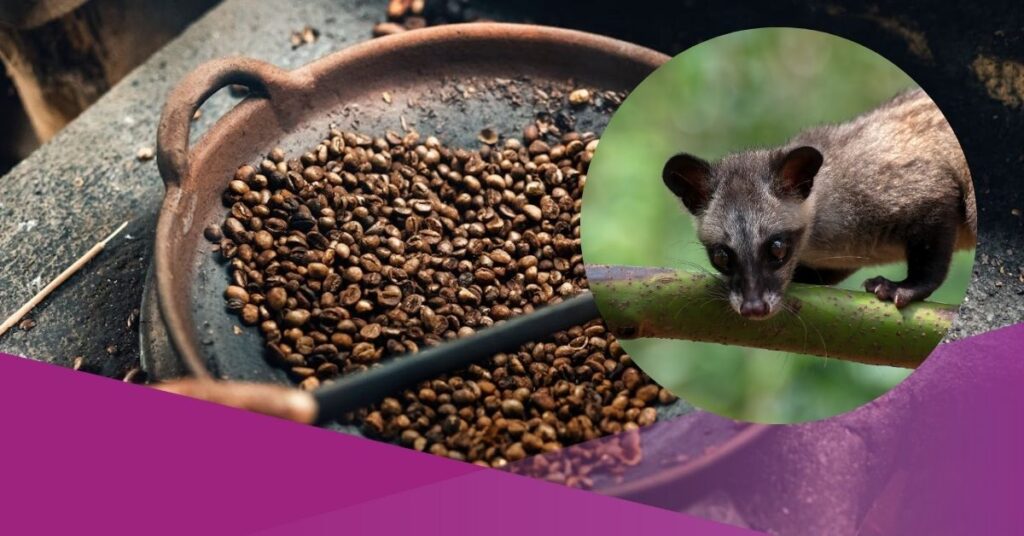Luwak coffee, also known as civet coffee, is one of the most distinctive and expensive coffee varieties in the world. Produced from coffee beans that have been consumed, partially digested, and then passed through the faeces of Asian palm civet (Paradoxurus hermaphroditus), this coffee has gained popularity both locally and internationally.
As demand for this unique coffee grows, Indonesian farmers continue to produce and sell luwak coffee, a trend that has proven resilient year after year.
What is Luwak Coffee?
Kopi Luwak, or luwak coffee (or some people also called it cat coffee), is a coffee made from beans that have passed through the digestive system of a civet, a small mammal native to Southeast Asia.
Kopi luwak is produced mainly on the Indonesian islands of Sumatra, Java, Bali, Sulawesi, and in East Timor.

After consuming ripe coffee cherries, the civet’s stomach enzymes ferment the luwak beans, breaking down certain compounds that make the coffee less bitter and smoother.
After several days, civets poop it out and the cherry is picked out of the poop and collected. The beans are then excreted by the animal, collected, cleaned, and processed into coffee.
Though the process may seem unappealing to some, many coffee enthusiasts swear by the flavour of this unique coffee.
Its distinctive production method, combined with the complex fermentation process, contributes to the distinctive taste and smoothness that luwak coffee is known for.
Despite its unusual origins, luwak coffee is celebrated for its refined and less acidic flavour profile.
The flavour characteristics of Kopi Luwak that not like any other coffee
The taste of Kopi Luwak varies depending on various factors, such as the type of coffee bean used, the region it is produced in, and the roasting process. However, most people describe it as having a rich, smooth flavour with chocolatey undertones. The fermentation process in the civet’s digestive tract helps to reduce the bitter, acidic notes that are common in many other coffees.
Some connoisseurs have also noted that the flavour can be somewhat musty, a result of the beans being fermented in the animal’s digestive system.
This subjective taste is part of what makes luwak coffee so interesting and unique, as different individuals may detect different flavours depending on their palate.
The coffee is often described as having a medium to full body, with a mellow acidity, making it suitable for those who prefer a coffee that is less sharp or acidic.
Overall, Kopi Luwak has a very distinctive taste that is smoother and richer than many other varieties, thanks to the fermentation process that takes place inside the civet.
The Price of Luwak Coffee
Luwak coffee is among the most expensive coffees in the world. The rarity of the beans, combined with the labour-intensive process of collecting and processing them, contributes to its high price.
At its peak, Indonesian luwak coffee has been sold for up to IDR 20 million (approximately £1,000) per kilogram.
In Indonesia, a cup of luwak coffee can cost around IDR 100,000 (about £5), making it a luxury item even within its country of origin.
The coffee has become a sought-after commodity around the world, with some high-end coffee shops offering it at a premium price.
For example, in California, United States, a coffee shop called Funnel Mill offers a cup of civet coffee for a staggering IDR 760,000 (around £40), illustrating just how expensive this coffee can be when sold internationally.
However, it is important to note that the production of civet coffee has raised ethical concerns. Some producers allegedly keep civets in captivity and force-feed them coffee cherries, which has led to widespread criticism from animal rights activists.
These practices have raised concerns about the welfare of the civets, leading many coffee lovers to seek ethically sourced luwak coffee.
Ethical Considerations and Sustainability
Given the ethical concerns surrounding the production of civet coffee, consumers must research and buy luwak coffee from trusted and ethical sources.
In Ubud, Bali, for instance, there are civet farms that are dedicated to produce kopi luwak more sustainably and humanely.
These farms often allow the civets to roam freely and only harvest beans from naturally dropped coffee cherries.
As a consumer, it is important to ensure that the coffee you are buying comes from ethical and sustainable farms that prioritise animal welfare.
This ensures that the production process does not contribute to the exploitation of animals and that the environment and local communities benefit from sustainable farming practices.
Best Luwak Coffee Recommendations
If you’re intrigued by the unique flavour profile of Kopi Luwak, here are some of the best coffee products available:
1. Excelso Kopi Luwak Toraja
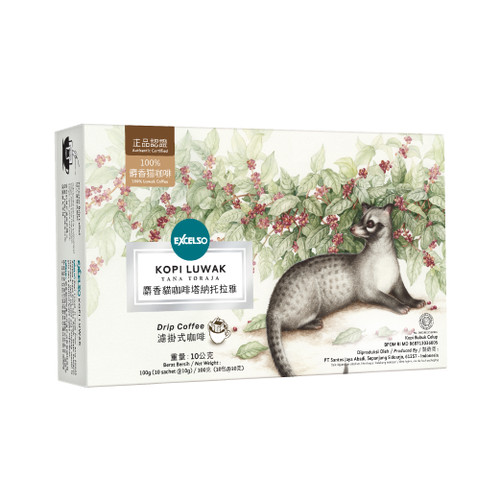
Excelso’s Kopi Luwak Toraja is made from beans sourced from Toraja, a region known for its exceptional coffee production.
This coffee has a spicy aroma with hints of fruit and a full body. Its low acidity makes it ideal for those who are sensitive to acidic coffee.
2. Kapal Api Easy Drip Luwak Blend
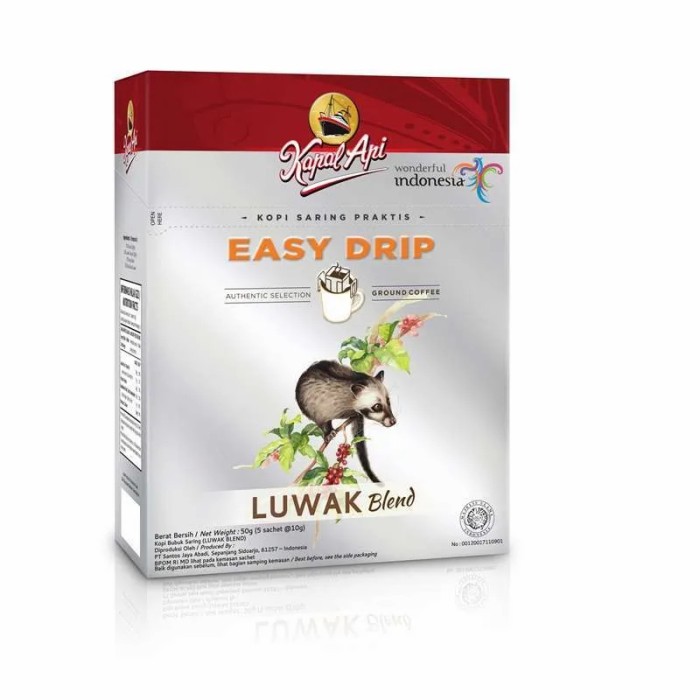
For coffee drinkers looking for convenience, the Kapal Api Easy Drip Luwak Blend offers a practical solution.
The blend combines luwak coffee with robusta beans from Toraja, delivering a distinctive flavour without leaving any grounds. This product is perfect for those who want to enjoy luwak coffee on the go.
3. Esvenco Drip Bag Coffee Luwak Blend
Lihat postingan ini di Instagram
Sebuah kiriman dibagikan oleh Esvenco Drip Bag Coffee (@esvenco.id)
Esvenco Coffee offers an easy-to-brew drip bag coffee that uses Arabica beans from Java.
Each 10-gram sachet delivers a rich and aromatic cup of coffee, and the beans are carefully selected following the SCAA Green Bean Coffee Classification System. A box of 7 sachets costs approximately IDR 70,000.
4. JJ Royal Coffee
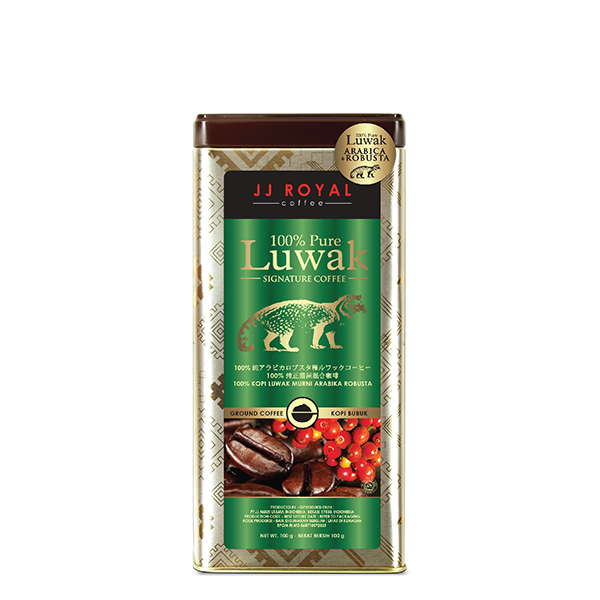
JJ Royal Coffee is renowned for its 100% pure Luwak coffee, which is medium-roasted to bring out the full flavour and aroma of the beans. It has a complex flavor profile that is smooth, earthy and sweet with a hint of chocolate.
This premium coffee is ideal for connoisseurs looking for an authentic luwak experience.
5. Sakha Coffee Kopi Luwak Arabica Gayo Coffee
Lihat postingan ini di Instagram
Sebuah kiriman dibagikan oleh Sakha Coffee Roastery (@sakhacoffeeroastery)
Available in both powder and bean packaging, Sakha Coffee’s Kopi Luwak Arabica Gayo offers a smooth and distinct flavour.
This product comes in a range of package sizes, from 100 grams to 500 grams, and is certified halal by MUI and licensed by the Health Office, ensuring its safety and quality. Prices range from IDR 89,990 to IDR 349,900.
6. ARUTALA Kopi Gayo Luwak Liar
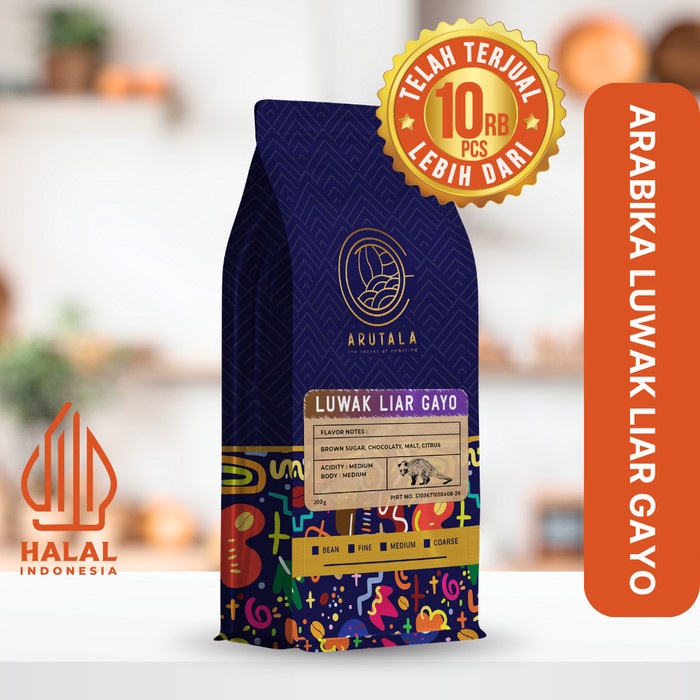
ARUTALA’s Gayo Luwak Liar is made from wild civet coffee beans sourced from Gayo, known for its complex flavour profile.
The coffee has notes of brown sugar, chocolate, malt, and citrus, with a medium acidity that appeals to those seeking a balanced and nuanced flavour.
7. Worcas Coffee
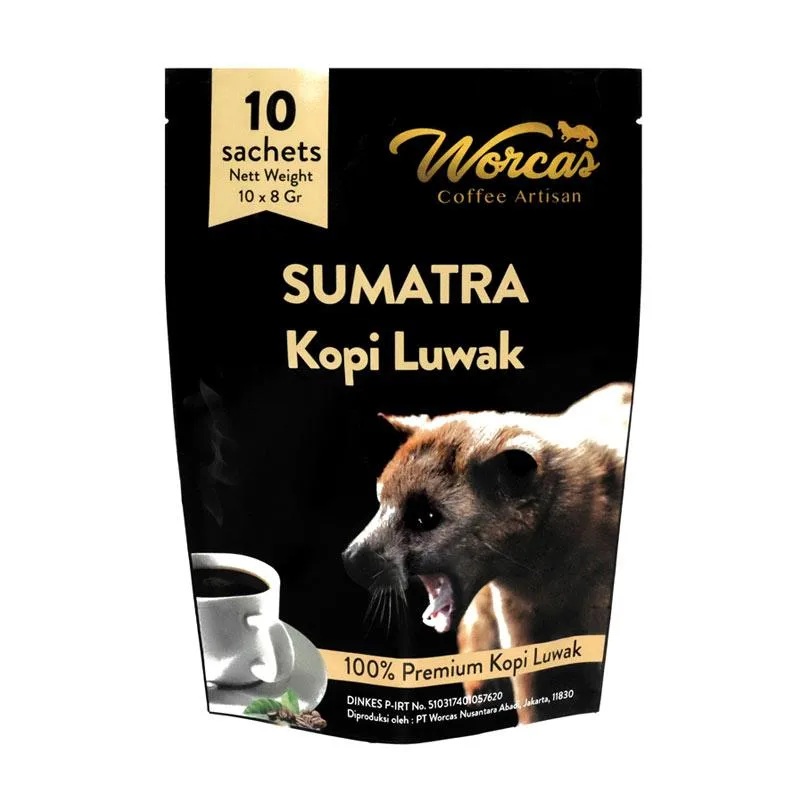
Worcas Coffee is another well-respected producer of high-quality civet coffee. Their range includes luwak coffee variants from various regions in Indonesia, including Aceh Gayo, Mandheling, Java Ijen, Bali Kintamani, and Flores Bajawa. Each region’s coffee reflects the local terroir and expertise in production, offering a diverse and exciting array of flavours.
Indonesian Luwak coffee offers a fascinating and unique experience for coffee lovers.
While its production has faced controversy, particularly regarding animal welfare, it remains a prized and highly sought-after coffee due to its distinct flavour profile and the intricate process of its creation.
When purchasing Kopi Luwak, it is essential to choose ethical and sustainable sources to ensure that both the environment and the animals are treated with respect.
If you’re interested in trying this exotic coffee, there are many excellent options available, each offering its own unique take on this iconic Indonesian brew. From the rich and smooth Excelso to the wild Gayo Luwak Liar, there’s a variety of flavours to suit every coffee enthusiast’s palate.
Cover: Photo by Aleksandar Pasaric/Pexels
